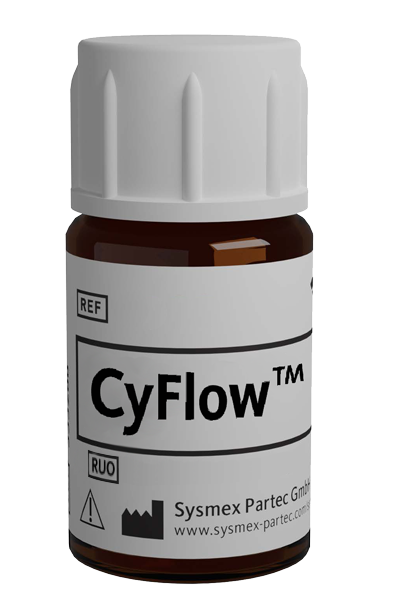CyFlow™ CD11a Purified

| Alternative Name: | LFA-1 |
| Antibody: | Yes |
| Antigen: | CD11a |
| Application: | Flow cytometry, Functional assays, Immunohistochemistry (frozen sections), Immunoprecipitation |
| Clonality: | monoclonal |
| Clone: | M17/4 |
| Field of Interest: | Immunophenotyping, MHC |
| Format/Fluorochrome: | Purified |
| Isotype: | IgG2a |
| Regulatory Status: | RUO |
| Source Species: | Rat |
| Target Species: | Mouse |
| Product number: | CA154449 |
For Research Use Only
| Concentration Unit | mg/mL |
| Concentration | 1 |
| Quantity | 0.1 mg |
| Volume | 0.1 mL |
| Immunogen | C57BL/6 mouse splenic secondary cytotoxic T lymphocytes |
| Background Information | CD11a (LFA-1 α) together with CD18 constitute leukocyte function-associated antigen 1 (LFA-1), the αLβ2 integrin. CD11a is implicated in activation of LFA-1 complex. LFA-1 is expressed on the plasma membrane of leukocytes in a low-affinity conformation. Cell stimulation by chemokines or other signals leads to induction the high-affinity conformation, which supports tight binding of LFA-1 to its ligands, the intercellular adhesion molecules ICAM-1, -2, -3. LFA-1 is thus involved in interaction of various immune cells and in their tissue-specific settlement, but participates also in control of cell differentiation and proliferation and of T-cell effector functions. |
| Storage Buffer | The reagent is provided in phosphate buffered saline (PBS) solution, pH ≈7.4, containing 0.09% (w/v) sodium azide. |
| Storage | Avoid prolonged exposure to light. Store in the dark at 2-8°C. Do not freeze. |
| Stability | Do not use after expiration date stamped on vial label. |
| Sanchez-Madrid F, Davignon D, Martz E, Springer TA: Antigens involved in mouse cytolytic T‑lymphocyte (CTL)‑mediated killing: functional screening and topographic relationship. Cell Immunol. 1982 Oct; 73(1):1-11. < PMID: 6983917 > | Kuhlman P, Moy VT, Lollo BA, Brian AA: The accessory function of murine intercellular adhesion molecule‑1 in T lymphocyte activation: Contributions of adhesion and co‑activation. J Immunol. 1991 Mar 15; 146(6):1773‑82. < PMID: 1672331 > | Yung R, Powers D, Johnson K, Amento E, Carr D, Laing T, Yang J, Chang S, Hemati N, Richardson B: Mechanisms of drug‑induced lupus (II) T cells overexpressing lymphocyte function‑associated antigen 1 become autoreactive and cause a lupus‑like disease in syngeneic mice. J Clin Invest. 1996 Jun 15; 97(12):2866‑71. < PMID: 8675699 > | Papayannopoulou T, Priestley GV, Nakamoto B, Zafiropoulos V, Scott LM, Harlan JM: Synergistic mobilization of hemopoietic progenitor cells using concurrent beta1 and beta2 integrin blockade or beta2‑deficient mice. Blood. 2001 Mar 1; 97(5):1282‑8. < PMID: 11222371 > | Koseki S, Miura S, Fujimori H, Hokari R, Komoto S, Hara Y, Ogino T, Nagata H, Goto M, Hachimura S, Kaminogawa S, Ishii H: In situ demonstration of intraepithelial lymphocyte adhesion to villus microvessels of the small intestine. Int Immunol. 2001 Sep; 13(9):1165‑74. < PMID: 11526097 > | Bellingan GJ, Xu P, Cooksley H, Cauldwell H, Shock A, Bottoms S, Haslett C, Mutsaers SE, Laurent GJ: Adhesion molecule‑dependent mechanisms regulate the rate of macrophage clearance during the resolution of peritoneal inflammation. J Exp Med. 2002 Dec 2; 196(11):1515‑21. < PMID: 12461086 > | Beyer M, Wang H, Peters N, Doths S, Koerner-Rettberg C, Openshaw PJ, Schwarze J: The beta2 integrin CD11c distinguishes a subset of cytotoxic pulmonary T cells with potent antiviral effects in vitro and in vivo. Respir Res. 2005 Jul 12; 6:70. < PMID: 16011799 > | Angelov GS, Guillaume P, Cebecauer M, Bosshard G, Dojcinovic D, Baumgaertner P, Luescher IF: Soluble MHC‑peptide complexes containing long rigid linkers abolish CTL‑mediated cytotoxicity. J Immunol. 2006 Mar 15; 176(6):3356‑65. < PMID: 16517703 > | Smith SS, Barnum SR: Differential expression of beta 2‑integrins and cytokine production between gammadelta and alphabeta T cells in experimental autoimmune encephalomyelitis. J Leukoc Biol. 2008 Jan; 83(1):71‑9. < PMID: 17928460 >
